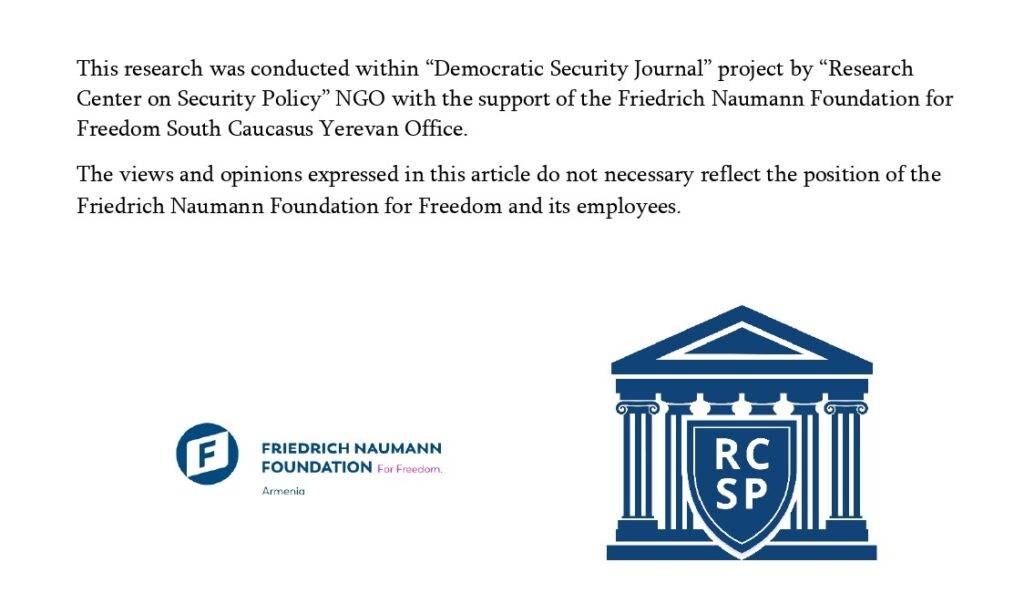The Course of Events
On March 13, the Republic of Armenia and the Republic of Azerbaijan separately announced the successful completion of negotiations on a peace agreement and bringing the agreement’s text to a common understanding. The separate statements were a consequence of an improper behavior by the Azerbaijani side, which had violated the previously agreed-upon arrangement to issue a joint statement and announced itself first and solely. Nevertheless, on the very day this became known, Armenia officially issued a response statement calling to begin consultations to determine the place and time of signing the agreement. Only after that did the Prime Minister of Armenia discuss the fact of reaching an agreement and the details of the situation in telephone conversations with the presidents of Russia, Iran, and France.
In the actual negotiation process, the following occurred: The Republic of Armenia unilaterally accepted Azerbaijan’s latest proposals regarding the peace agreement and confirmed the latest text sent by the Republic of Azerbaijan within the framework of “electronic diplomacy”. The agreement is written in three languages: Armenian, Azerbaijani, and English. Moreover, priority as the working language is given to the English version, and if differences arise in the text reading of Armenian or Azerbaijani versions, English is used as the basis. In the English version, the agreement’s title is “Agreement on the Establishment of Peace and Interstate Relations between Armenia and Azerbaijan.” Furthermore, the document specifies that it comes into force only after passing domestic ratification procedures. This is in response to inappropriate interpretations spread in recent days in Armenia and Azerbaijan, which claim that this is not a document requiring signature or ratification, or even a serious document. From a legal perspective, in the case of both an agreement and a treaty, it is necessary to refer to the content, within the framework of which the essence of the document is determined. Therefore, there is no clear legal, political or other hierarchy between these words.
Azerbaijan’s Response
The parties’ statements received an unprecedented response from the international community, with over 60 states and international organizations expressing their satisfaction with the progress and calling to continue the process and sign the peace agreement. And at the moment when calls are heard from all sides to make a quick decision on the progress and consolidate the achieved success, Azerbaijan suddenly announces two preconditions for signing the agreement and mentions shootings by the Armenian side.
The point about preconditions is deliberately written suddenly, as the issue of the RA Constitution has never been a subject of bilateral negotiations. Yes, there have been statements about this in Azerbaijan, but in Armenia, they are long accustomed to strange statements from Azerbaijan, such as those about returning the weapons and ammunition of the RA Armed Forces to the seller. Moreover, the decision of the RA Constitutional Court regarding demarcation regulations eliminates all “issues” concerning territorial claims, which Armenia does not have against Azerbaijan in the first place. The process of changing the country’s Constitution, which was on the agenda even before the 2020 war and continues to be so to this day, is Armenia’s internal affair, and Azerbaijan’s attempts to interfere in this process only lead to negative consequences.
Regarding Azerbaijan’s other demand about dissolving the OSCE Minsk Group, it is even strange to discuss this topic, as Armenia has accepted it, declaring at the highest level that it is ready to jointly apply to the OSCE on this issue either after or simultaneously with the signing of the agreement. Besides, methodologically, not including certain important requirements in the text of the peace agreement, not negotiating around them, and then presenting the issue in a way that the peace agreement will be signed only if two requirements/points not included in its text are fulfilled, is absurd.
As already mentioned, in addition to these demands, Azerbaijan was also spreading obvious misinformation. Between March 16-18, the Azerbaijani Ministry of Defense made 11 statements about alleged border shootings by Armenia in various points of the Armenia-Azerbaijan border’s southeastern section. This is a border that Azerbaijani resources call “conditional”, using inappropriate Turkic place names and administrative units that do not exist in Armenian territory in their reports. In all cases, Armenia has denied this information, and the EU Observation Mission in Armenia, in turn, issued a statement noting the absence of any activity on the border.
On March 18, trying to return the situation to a manageable framework, an extensive statement was distributed by the RA Prime Minister’s Staff, emphasizing the absence of instructions or motives for firing shots from the Armenian side. Additionally, the statement reminds Azerbaijan that months ago, Armenia proposed creating border monitoring and border incident investigation mechanisms to exclude such situations, to which Baku has not responded so far. Despite this, the Armenian side proposed conducting an investigation into the events announced by Azerbaijan between March 16-18 if Baku provides evidence substantiating what occurred. No response was received from Azerbaijan to this proposal either. Another mechanism for de-escalation on the border proposed by the Armenian side is the continuation of the demarcation and delimitation process where too progress has not yet been spotted.
International Positioning
Returning to the topic of international statements, I believe it is especially important to present the statements made by the three co-chairs of the Minsk Group.
- French President Macron, in particular, announced that there are no more obstacles on the path to regional peace and development.
France’s position is what the EU and other EU member states lack – clear indications and involvement. If we look at the process more comprehensively, increasing Armenia’s resilience and French participation in that process are among the most important components of the recorded progress in the negotiation process. Azerbaijan will try to move forward against Armenia under pressure, use of force, or the threat thereof, as long as it remains sufficiently “cheap”. Azerbaijan has now become much more negotiable, primarily because Armenia is not as defenseless and alone as in 2021-22. It is necessary to be free of illusions and fully understand that if Azerbaijan had such an opportunity, the complete destruction of Armenia and total displacement of Armenians would be Baku’s current policy. Those who doubt this thought should recall their skepticism when they were told that the moment Azerbaijan could take complete control over Karabakh, it would completely depopulate it. As a matter of fact, this is exactly what happened. Thus, Armenian-Azerbaijani negotiations make sense and are possible only if Armenia is capable of defending itself. This has been understood in France, and France is working on this. Armenia’s Western choice and Western trajectory have a serious opportunity to record synergy with the awakening of forces in Europe and at least the ambition of returning as a prime player in geopolitical processes. Notably, when discussing support for Armenia from the EU and especially France, Azerbaijani political figures and experts note: “This is not just regular symbolic support signaling mutual recognition of ties—it is support targeted at minimizing Azerbaijan’s regional position, complicating the official peace track, and crucially, preventing Armenia’s acceptance of its wrongdoings and countering Yerevan’s (albeit partial) desire to move forward in a new direction. Organizations like the European Union Mission in Armenia (EUMA) are among such initiatives.” Thus, Azerbaijan continues to view the deepening of Armenia-EU relations and the strengthening of EU positions in the South Caucasus as an obstacle to its “sub-hegemony” dream. In an ironic twist of fate, if Azerbaijan is so concerned about the EU observation mission’s activities on the Armenian-Azerbaijani border – about which Azerbaijani officials and media constantly declare and write, accusing the mission of spying in Armenia’s favor, gathering intelligence data, and so on – then henceforth the mission will remain on the border because of only one country, and that is Azerbaijan. Now Azerbaijan has all possibilities to cease the mission’s activities on the border and remove this topic that has so worried it from the agenda. For this, the signing and ratification of the peace agreement is sufficient.
- From Russia, words of support were also voiced at the Foreign Ministry level, simultaneously reminding of the 2021-2022 trilateral agreements between Armenia, Russia, and Azerbaijan.
However, it is obvious that Russia is not interested in any Armenian-Azerbaijani development or, even more so, a lasting settlement without its active participation. In general, internal Georgian conflicts and the Armenian-Azerbaijani conflict are the main tools of post-colonial governance for Russia in the South Caucasus. And the main external threat to the peace process comes from Russia.
- The statement regarding the telephone conversation between US National Security Advisor Michael Waltz and Azerbaijan’s presidential adviser Hikmet Hajiyev was perhaps the most important among the responses.
Waltz stated that the conflict in the South Caucasus must end… “WE should finalize this peace deal now, release the prisoners, and work together to make the region more secure and prosperous…” Moreover, Waltz pointed out that the agreement must be brought to life, symbolizing the “America’s Golden Age that will bring peace and prosperity to the world.” It can be thought that from the US perspective, the conclusion of the peace agreement is perceived as a process occurring within the coordinates of its own interests. When we add to this the response of Azerbaijani government-adjacent circles and references to possible American participation in the peace process – drawing parallels to the 1978 Camp David process or the Abraham Accords signed during Trump’s first administration, while praising Trump’s personal role – an impression is created that Baku would be in favor of what they perceive as neutral American participation. I believe, from Armenia’s perspective, the participation of a mediator or guarantor in negotiations from this point forward would seem acceptable. However, I want to remind that previously, it was Azerbaijan that actively opposed the participation of any third party. There are two possible explanations for why Baku has changed its mind. First, the desire to balance Russia through the US and “guarantee” the peace agreement via American involvement. The United States is perhaps the only state capable of countering potential actions by Russia aimed at disrupting the Armenian-Azerbaijani settlement in the South Caucasus. The next option are the expectations of certain security guarantees for the existing Azerbaijani regime from the US, similar to the regimes in the Persian Gulf countries. However, peace alone cannot be a sufficiently high price – Azerbaijan must be able to offer other services to the US. Armenia’s task should be to have at least partial transit of these services likely to be of infrastructural nature through Armenian territory.
The second part of the article is here.
Areg Kochinyan


